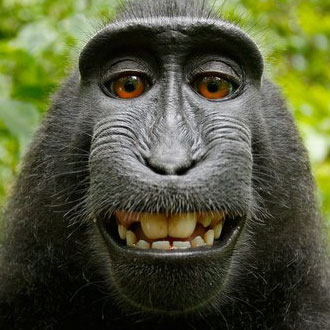What would we do without the Web. It teaches us many helpful things, such as how to not clean your camera. Now, this being planet earth with various forms of life that have no say in how the human species treat them, it is about time to set a fundamental universal law straight: don’t you ever monkey with the monkey. Because a monkey has (copy)rights.
Take this. A monkey shoots a great selfie. And Wikipedia refuses to delete the photo. Because the “monkey owns it.” The photographer, or shall I rather say: the owner of the camera is lost for words. True, many of the selfies were blurry, some were pointed at the jungle floor. But among them was a treasure trove of fantastic monkey selfies — including one taken by a grinning female macaque which made headlines around the world. And brought British nature photographer David Slater his 15 minutes of fame.

Back that day in Indonesia in 2011, the day that Mr. Slater’s started doubting human mankind’s state of judicial development, the quite mischievous monkeys were jumping all over his equipment. “It looked like they were already posing for the camera when one hit the button,” Slater said at the time. The sound got the monkeys’ attention — one kept pressing it: “At first it scared the rest of them away but they soon came back — it was amazing to watch.”
Problem is, the monkey obviously hadn’t worked out focusing yet. By the time Mr. Slater got his camera back, not very many of the hundreds of pictures taken by the money were in focus.
The selfies though spread around the world, appearing on website, newspapers, magazines and television shows. Mr. Slater didn’t see a cent for any of it. To add insult to injury, Wikimedia, a global movement whose mission is to bring free educational content to the world, added the most famous image to its collection of royalty-free images online. The Wikimedia Commons is a collection of some 23 million images and videos that are free to use by anyone online, and editors have included the famous monkey selfie among its database.
Mr. Slater, for his part, sees his income jeopardized as anyone can take the image and publish it for free. His problem though is: he has no claim on the image as the monkey itself took the picture.
Thinking of it, why doesn’t he just ask the monkey to become his agent and collect the well-deserved royalty on behalf of the hairy creative. But Mr. Slater wants a court to decide who owns the copyright. Hey, says Mr. Slater, “A monkey pressed the button, but I did all the setting up.”
And whose camera is it?! And did the monkey extract the photo and upload it? And the trip for that monkey shot wasn’t free, not to mention the equipment Mr. Slater carried, the insurance, the computer stuff, you name it.
“Photography,” concludes Mr. Slater, “is an expensive profession that’s being encroached upon. They’re taking our livelihoods away. For every 10,000 images I take, one makes money that keeps me going. And that was one of those images. It was like a year of work, really.”
U.S. law would suggest that “non-human authors” do not have the right to automatic copyright of any photographs they take. But to claim copyright, Wikimedia argues, the monkey in this case would have had to make substantial contributions to the final image, and even then, it would only have copyright for those alterations, not the underlying image.
This means that there is no one on whom to bestow copyright, so the image falls into the public domain. Even though the no copyright argument is very disrespectful of the photographer who created the conditions that allowed these photos to be created.
Mr. Slater insists it’s ridiculous that he doesn’t own the copyright because his finger wasn’t on the camera’s shutter button. Photography is his only source of income, he says. But remember, it’s anarchy out there in the Internet. Photographers might depend on such lucky, brilliant shots. Once they’re out in the wild though you lose control over it. Basically, everything published today is public domain. If you intend to make money with a photo, never ever upload or share it online.
Is copyright making a monkey out of David Slater?
And animals have rights, too. Wouldn’t be surprised if the monkey finds a lawyer to sue dear Mr. Slater.
The implications of all of this are far-reaching. Don’t leave your smartphone out of sight. Your paparazzo hamster might sue you.


